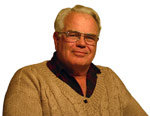Jim’s father was a livestock veterinarian, servicing the farms of southwestern Ohio in the post-War years. “He didn’t want to deal with dogs and cats because people were too emotionally connected with them,” says Jim. “Somebody will call up at three in the morning and say, ‘Oh Phoebe has the sniffles.’ Big deal! It’s hay fever season. All the Phoebes are having sniffles.” Jim’s own dogs, Rebecca and Violetta, patter and shirk beneath the kitchen table.
In an emotional time and an emotional city, Jim’s a conservative—one of thirty-two Bush voters in his district. He likes the President’s foreign policy. Privatized social security is good. Steel tariffs were clearly a blunder, though.
“Laws are composed, supposedly, when people are cool, rational, thinking about it, considering implications,” Jim says. “But there’s an immediate emotional clash on the part of a liberal, when he decides on a course of action without regard to regulations.” Jim doesn’t see anything morally wrong with gay marriage. But that doesn’t mean Mayor Newsom can just start performing them. You have to legalize it first. Jim doesn’t rant or point fingers; he just knows his Constitution cold.
Jim came to San Francisco in 1966 after a stint as a Peace Corps horticulturist in Guinea. He had a BA in philosophy, so he found work as a fry cook before hunkering down to adjudicate applications at the Passport Office for twenty-five years. He remembers two applicants: one, born at sea off Honolulu, who lived his whole life in the US, was drafted in Vietnam but never naturalized; the other, an elderly Serbian who’d set foot in the States once—the week of her birth. The first couldn’t get a visa to visit family in Portugal; the second walked away with a passport. “That did not feel good,” Jim says softly. But rules are rules, not feelings.
Retired, he now scoops ice cream a few days a week at a neighborhood parlor. He had always read the newspaper, but now there’s time to read the newspaper. He’s blossomed into a savvy letter-to-the-editor writer whose credits include USA Today. Frequently, it’s just a matter of reminding excitable liberals that the world isn’t perfect: all the Phoebes are having sniffles.
Of his younger years, he admits, “I thought that things should be running perfectly, and they weren’t, and I thought government should be doing something about it.” But he’s come to see a culture of complaint, especially in the middle and upper classes—individuals foisting their responsibilities on government. “So many liberals think they’re being altruistic,” Jim says, “if they vote for the government to take money away from people who earn it and give it to people who don’t. Now, the government can’t be altruistic. Government is an inanimate creation. If you take money out of your own pocket and give it to someone, however,”—and Jim does—“yes, that’s altruistic.”
Moreover federal altruism dampens democracy. “Even if a very poor person has to send fifty cents to the government once a year, it establishes a stake,” Jim says. It puts him in mind of something he read in a Mensa bulletin years ago (Jim’s a member). The crux: anteing up doesn’t just pay the house, it keeps us all at the table together.
Later, while Jim argues against recent, irrational legislation put forward by city government liberals clambering for tenants’ rights, the power goes out, blackening his congested kitchen. The lights flicker on and off again.
Returning with a flashlight, still talking, Jim sees that, in the confusion, he’d knocked his coffee cup over into the heap of mail. The new issue of Smithsonian is sodden and stained. Bills wrinkle in a brown puddle. Jim surveys the damage, then calmly resumes. “Now by freezing rents….” And as he continues—a flashlight jerry-rigged under his arm—he sets about blotting things dry, one by one, with a flowered sponge.





